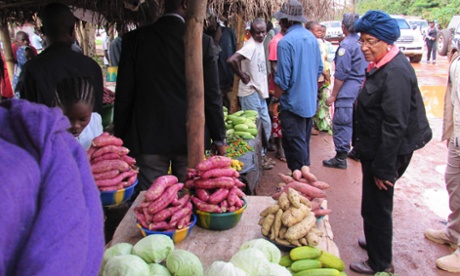Exclusive: Mike Rawlings said President Ellen Johnson Sirleaf had said she felt accountable for the situation in the Texan city

The president of Liberia telephoned the mayor of Dallas and apologised for the fact that the Ebola virus had transferred from her country to his city and infected Americans, the mayor said during a conference call with religious leaders in Texas on Friday.
The mayor, Mike Rawlings, said President Ellen Johnson Sirleaf had said she felt accountable for the situation in the Texan city, where a man who had recently returned from Liberia infected two nurses who treated him before he died, according to two people on the conference call.
“The mayor said that there was a call to him personally, and that the Liberian president had mentioned apologies, and, in his words, a little bit of responsibility that this was even happening,” Rex Howe, a pastor at Scofield Memorial church, told the Guardian.
Dr John Carlo, a former medical director for Dallas county and the chief executive of an Aids prevention non-profit, added that Rawlings said he “did not accept” the president’s apology. “He feels that this is a global community, and there was no fault by the Liberian people,” said Carlo, who addressed the faith leaders after the mayor. “I think that was a good message.”
The Liberian patient, Thomas Eric Duncan, died on 8 October, almost three weeks after flying to the US from Monrovia, the capital of the west African state, where thousands of people have been killed by an outbreak of Ebola. He had come into contact with a woman there infected with the virus.
Two nurses who helped treat Duncan before he died at Texas Health Dallas Presbyterian hospital, Nina Pham and Amber Vinson, became the first two people known to have contracted Ebola on US soil. They are being treated in specialist facilities in Georgia and Maryland. Pham’s condition was lowered by health officials on Friday from good to fair.
Howe, the pastor, said the mayor had also recounted telling Sirleaf that once Dallas had taken stock of its “failures and successes” in dealing with the virus, “there may be things we can share with both the US and the rest of the world about what we’ve learned, about what to do and what not to do”.
Asked to confirm that Sirleaf had called the mayor, Gabriel Williams, a spokesman for the Liberian embassy in Washington, said: “I wouldn’t be able to comment on that right now.” A public relations firm handling media for Rawlings did not return requests for comment.
Rawlings also disclosed during the call that the first of 48 people being isolated and monitored by authorities for signs of Ebola, after coming into contact with Duncan when he became ill, had emerged from quarantine after the required 21 days without symptoms. The man, who was not identified, was said have visited Duncan’s apartment after he began feeling sick on 24 September.
Duncan’s fiancee, Louise Troh, remains quarantined until the end of the weekend. Troh’s 13-year-old son, Duncan’s nephew, and another man – all of whom were staying with Duncan in the same apartment – are also scheduled to emerge from the same restrictions at the same time as Troh.
An estimated 100 faith leaders were invited to join the conference call on Friday afternoon. Participants received an email invitation from Amanda Sanchez, Rawlings’s community outreach coordinator.
Rawlings was also said to have reiterated a warning he has made elsewhere that “we’re not out of the woods yet” and that another diagnosis should not come as a surprise. “Honestly, we should expect to see another case or two,” Howe recalled the mayor saying.
